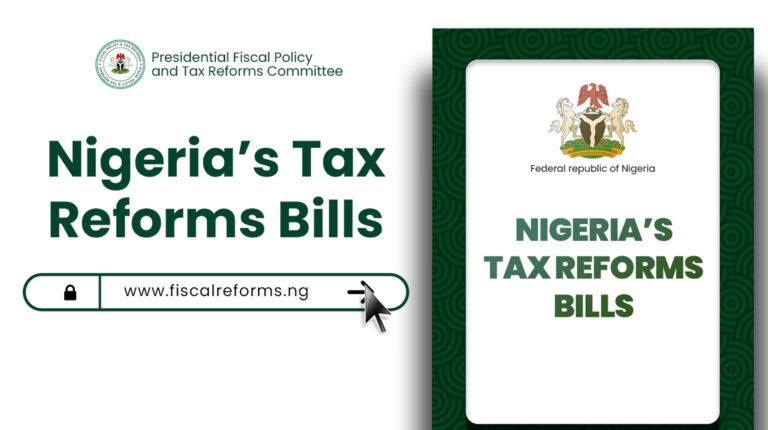Nigeria’s Tax Reform Bills, 2024, is a transformative legislative effort designed to modernize and harmonize the taxation framework in Nigeria. As a cornerstone of President Bola Ahmed Tinubu’s fiscal reform agenda, the bill consolidates multiple tax laws, introduces new levies, and enhances compliance measures to improve the overall efficiency of the tax system. The four bills to wit: the Nigeria Tax Administration Bill, the Nigeria Revenue Service (Establishment) Bill, the Joint Revenue Board (Establishment) Bill, and the Nigeria Tax Bill aim to simplify tax laws, foster compliance, enhance economic growth, and maintain fairness in the distribution of tax system in Nigeria. This article comprehensively analyzes Nigeria’s Tax Reform Bills, 2024, highlighting the key provisions, expected impacts, and compliance requirements.
OBJECTIVES OF THE TAX REFORM BILLS
1. The reform bills consolidate Nigeria’s various tax laws into a single framework, simplifying compliance and reducing ambiguities for taxpayers.
2. It expands the tax net by including digital services, non-resident businesses, and previously under-taxed or untaxed sectors.
3. Encourages economic growth through targeted tax incentives and reliefs.
4. Enhances revenue generation for national development.
KEY HIGHLIGHTS OF THE TAX REFORM BILLS
The Tax Reform Bills introduces several landmark provisions that redefine taxation in Nigeria and some of them are as follows:
a. Exported goods (excluding oil and Gas) services and Intellectual property are to enjoy zero-rated Value Added Tax (VAT).
b. Small businesses with an annual turnover of N50,000,000 (fifty million naira) or less are exempted from corporate income tax, VAT, and Withholding tax.
c. Establishment of the tax ombudsman, i.e., the Joint Revenue Board, to harmonize, coordinate, and settle disputes arising from revenue administration in Nigeria.
d. Foreign currency-denominated transactions will be paid in Naira to reduce the pressure on the exchange rate and simplify business compliance.
e.The tax reform bills propose a repeal of over 50 taxes and levies and harmonize the remaining taxes to a single digit.
f. The bill proposes a basis for VAT revenue sharing amongst states to ensure that states without many headquarter companies are rewarded for their economic contributions
g. Income tax rates for companies are streamlined based on profitability, with specific incentives for small and medium enterprises. Income tax for small companies is assessed at zero percent and for other companies, at the rate of 27.5% in the 2025 year of assessment, and 25% from 2026 year of assessment and onward. Companies are taxed at rates proportionate to their profitability, with specific rates for small and medium enterprises (SMEs) to promote entrepreneurship in Nigeria
h. Personal Income Tax is reinforced, with higher rates for top earners. This means that individuals who earns less than N800,000 pay 0% taxes. The taxable income ascertained shall be taxed at the following rates: (a) First N800,000 at 0%; (b) Next N2,200,000 at 15%; (c) Next N9,000,000 at 18%; (d) Next N13,000,000 at 21%; (e) Next N25,000,000 at 23%; and (f) Above N50,000,000 at 25% respectively.
i. The bill also proposes to establish the Nigeria Revenue Service in place of the Federal Inland Revenue Service with the powers and responsibility of accessing, collecting, and accounting for revenue accruable to the Federal Government.
CONCLUSION
The Tax Reform Bills, 2024, has sparked widespread public discourse, with support and opposition from various quarters. Critics have expressed concerns about its potential socio-economic impact specifically focusing on issues such as timing, fairness, and consultation processes.
Many critics have pointed out that the timing of the bill is problematic, as Nigerians are still reeling from recent economic adjustments like fuel subsidy removal. They argue that introducing higher taxes or additional levies could exacerbate poverty and diminish the middle class.
The proposed derivation-based model for Value Added Tax (VAT) revenue allocation has been contentious. Critics argue it disproportionately favors states like Lagos and Rivers while potentially disadvantaging less industrialized northern states, raising fears of deepened regional inequality. Northern stakeholders, including governors and traditional leaders, have raised concerns that the reforms might strain local resources and deepen regional disparities. The Northern Elders Forum has warned against policies that could undermine national unity.
Key figures in Nigeria have emphasized the need for robust public hearings and consultations to ensure inclusivity and transparency. Many stakeholders feel excluded from the legislative process, fueling mistrust towards the reform.
Despite the criticisms, supporters of the bill, argue that its transformative provisions could enhance revenue mobilization, streamline tax administration, and promote equity in Nigeria’s tax system. They urge the public to focus on the long-term benefits of the reform, such as increased funding for infrastructure and development projects.
The Nigeria Tax Bill, 2024, is currently at the second reading stage in the National Assembly. This phase is crucial for lawmakers to debate its provisions, gather public input, and refine the legislation. The bill will proceed to committee reviews and subsequent readings before potential passage into law.
The ongoing debate underscores the need for balanced and inclusive deliberations to ensure the reforms address Nigeria’s fiscal challenges without imposing undue hardship on its citizens. The outcomes of these legislative discussions will shape Nigeria’s economic trajectory in the future.
For legal advice on company tax matter feel free to reach out to us HERE, and we’ll be delighted to assist you.
